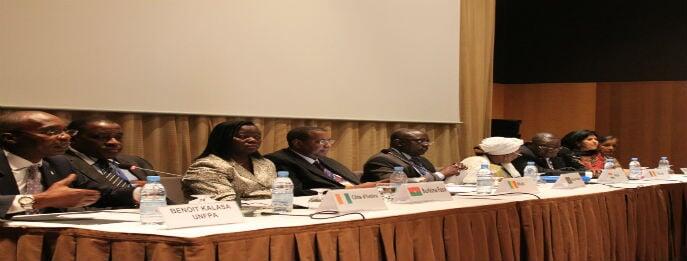This project represents the commitment of World Bank President, Dr. Jim Yong Kim, UNFPA Executive Director, Dr. Babatunde Osotimehin, and the UN Secretary General, Ban Ki-moon, to act for women’s empowerment and demographic dividend in the Sahel during their high-level visit in the region in November 2013. Responding then to the appeal of the President of Niger, Mahamadou Issoufou.
As part of the project preparation, the two international organizations met in Dakar with their partners and technical experts - 7 and 8 July 2014 - to identify priority actions and develop the modalities of implementation. This meeting was followed, on 9 July, by a high-level regional conference about that ten ministers of the concerned countries attended.
The Sahel is characterized by extreme poverty, food insecurity and internal vulnerability especially due to conflicts and droughts. Nearly one in two people live on less than $1.25 a day; more than 11 million people are under threat of hunger and 5 million children under five suffer from acute malnutrition. Even if economic growth is noted, poverty persists, partly because of the countries’ demography. However, the Sahel can capitalize on its demography and reap the benefits of the demographic dividend.
The demographic dividend is the accelerated economic growth generated by the declining mortality and fertility in a country and followed by a gradual change in the age structure of the population: young dependent population becomes smaller compared to the working age population. With fewer dependents to support, a country benefits from a window of opportunity for rapid economic growth, if it goes with appropriate policies promoting human capital, employment and investments, particularly in health, education and governance.
For the Regional Director of UNFPA for West and Central Africa, Benoit Kalasa, this initiative is not isolated. Indeed, he added, "it fits into other ongoing actions. We want to get politicians accept women’s empowerment as a starting point and combine our efforts to enable women and girls to be able to make decisions and to act on family structure. We want to keep girls longer in school, in order to minimize the risks of early marriage, and provide them with good education and financial autonomy. "
The Sector Manager, Health, Nutrition and Population for West and Central Africa of the World Bank, Ms. Trina Haque, for her part, explained that the conference helped to "reconfirm our commitment on the demographic dividend. We must support this window of opportunity to increase economic growth. This can only be achieved by investing in human capital and working towards a demographic transition. "
Amadou Boubacar Cisse, Niger State Minister of Planning, Regional and Community development, speaking at the opening of the high-level conference, said that the Sahel countries face common issues. He welcomed the collective response following the Appeal of Niamey and outlined that "this first regional meeting is useful because it will allow us to agree on priorities for the regional project on women's empowerment and the demographic dividend and then define the outline of institutional coordination at the regional level."
"I reiterate the commitment of the Government of Niger to accelerate the process of demographic transition in a regional context. Sahel G5 (note: group of 5 Sahel countries) scored the demographic transition as unavoidable for the development of the Sahel", he added.
The women’s empowerment project covers three components. The first component is about improving the demand for family planning and maternal and child health services.
The second component aims at developing regional capacity for securing contraceptives and life-saving maternal and child health commodities, and for the training of skilled health workers such as midwives.
The last component focuses on strengthening political commitment and the capacity to develop policies in order to implement the project, monitor and evaluate it.
As the representative of the country chairing the African Union, the Mauritanian Minister of Finance, Mr. Diombar Thiam, made the closing remarks of the conference which concluded with the commitment of all six countries to be part of the project, expected to begin in January 2015.


